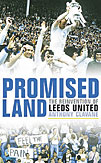 The Reinvention of Leeds United
The Reinvention of Leeds United
Anthony Clavane
Yellow Jersey, £16.99
Reviewed by David Stubbs
From WSC 285 November 2010
Thanks to the searing influence of David Peace, Leeds Utd currently burn vividly on the collective consciousness. It helps that their team-sheet remained so constant under Don Revie – nine of the 1963-64 promotion squad were still regulars nearly a decade later. Even many non-supporters of a certain age can recite the classic line-up, as easily as if it were the Dad's Army platoon – Sprake, Reaney, Cooper, Madeley, etc, invariably culminating in Bates – Mick Bates, the perennial substitute and Private Sponge of the organisation.
With Promised Land, Sunday Mirror journalist Anthony Clavane might appear to be riding on the coat-tails of all things Damned United. He even employs the Peace device of commencing chapters with italicised, emotional, ruminative passages which sit apart from the narrative. However, Clavane, who was brought up in Leeds during the 1960s and 70s, coming from a Jewish family who had first settled in the city around the turn of the century, provides a splendidly acute, richly evocative and autobiographically laced take on familiar material. This isn't just a history of Leeds Utd but a condensed history of the town, whose undulating fortunes and thwarted ambitions to get beyond itself have been reflected in the history of its football club, which has oscillated between over- and under-achievement.
It's also a history of the growing influence of Leeds' Jewish community over both town and club, initially ostracised but, through figures like chairman Manny Cussins, eventually reaching the point where one club director would remark: "There'd be no Leeds Utd without the Jews." Yet anti-Semitism was never quite extinguished, always threatened to recrudesce.
No page goes unturned without the eyebrow raising at some telling detail, like the single seashell listed among the pioneering black player Albert Johanneson's possessions after he was found dead in his flat aged 53. Clavane draws telling parallels – between the fire-sale Leeds City were obliged to undertake at the Metropole Hotel, following financial ruin and dissolution in 1919 (raising just £10,000 for the entire squad), and the similarly ignominious sell-off following the doomed Ridsdale effort to "Live the dream" in the Noughties. There is a sense of a city, a team, in the debilitating grip of the fatalism and morbid superstition which beset Revie in his later years, when, to paraphrase Brian Clough, he had his players believing in everything but themselves. At key moments, in key finals, Leeds' nerve seems to fail them, as it does Billy Liar in the final scene when Julie Christie departs for London without him.
The author parallels the nadir of Leeds Utd FC circa 1978 against the city at the time, stalked by the Ripper, its idealistic Quarry Hill housing project recently demolished. Leeds' recent footballing misfortunes are set against the backdrop of a shiny, post-modern urban regeneration scheme gone awry, with thousands of riverside apartments currently sitting empty. Racism is a recurring menace, be it that faced by his Jewish ancestors, through to the 1970s and the malignant presence of the National Front and Service Crew, to Bowyergate and present-day antipathy towards Leeds' Pakistani community, from whose ranks the July 7 bombers were drawn.
And yet there are moments of improbable resurgence and civic pride – the 1970s rise of Super Leeds, the inspirational courage of the Leeds United Against Racism initiative in the 1980s and the miraculous League triumph of 1992. Even today, there is hope in Leeds overcoming Bristol Rovers on the final day of last season when they looked as if, yet again, they were going to choke. All they need is for the club to be prised from Ken Bates's cold, undead hands and neutrals could learn to like the club once more. They should certainly have no trouble enjoying this book.